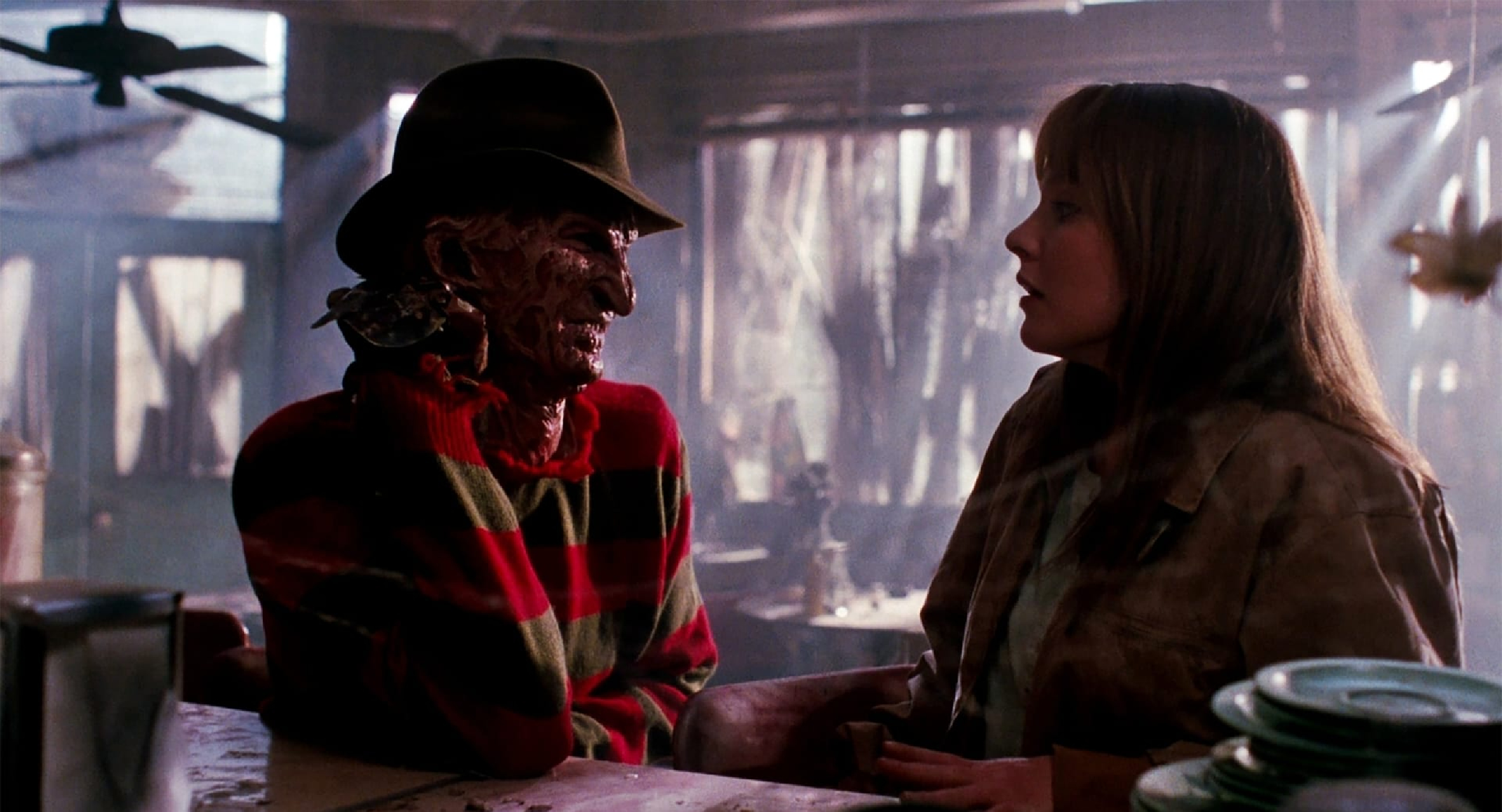Dream demon Freddy Krueger is resurrected from his apparent demise, and rapidly tracks down and kills the remainder of the Elm Street kids. However, Kristen, who can draw others into her dreams, wills her special ability to her friend Alice. Alice soon realizes that Freddy is taking advantage of that unknown power to pull a new group of children into his foul domain.
A Nightmare on Elm Street 4: The Dream Master – Film Review
Published September 7, 2023

The story begins with the surviving Elm Street children from the previous films, Alice (Lisa Wilcox) and her friends. Alice possesses a unique ability to absorb the personalities and powers of her friends who have already fallen victim to Freddy. This premise has potential, but it quickly descends into a convoluted mess. The film rushes through character development, leaving us with one-dimensional, forgettable characters. We barely get to know them before they meet their gruesome ends, making it difficult to invest in their fates.
The Dream Master‘s plot is muddled and lacks the thematic depth of its predecessors. Freddy’s motivations seem to be solely about sadistic pleasure rather than exploring the psychological and subconscious aspects that made the original film so compelling. The dream sequences, a hallmark of the franchise, often feel forced and gimmicky, lacking the eerie and surreal atmosphere of earlier entries. It’s a missed opportunity to delve deeper into the realm of dreams and nightmares.
Freddy Krueger, played once again by Robert Englund, remains the highlight of the film. Englund’s charismatic performance keeps the character alive, even if the material he’s given to work with is subpar. However, the film’s focus on making Freddy a wisecracking stand-up comedian diminishes his terror factor. The balance between humor and horror that worked so well in previous films is tilted too far towards comedy here.
Alice, the film’s protagonist, starts as a timid and introverted character but undergoes a rapid transformation into a confident warrior as she inherits the abilities of her deceased friends. While the concept of Alice evolving into the “Dream Master” is intriguing, it feels rushed and unearned. Her character arc lacks the depth and emotional resonance found in Nancy’s journey in the original film.
The supporting cast is largely forgettable, with the exception of Alice’s brother, Rick (Andras Jones), who shows glimpses of charisma but isn’t given enough screen time or development to leave a lasting impression. The other Elm Street children are mere cannon fodder for Freddy, making their deaths feel more like a checklist than a meaningful part of the story.
Renny Harlin, known for his work in action films, brings a different style to the Nightmare on Elm Street franchise. While there are some visually interesting sequences and creative kills, the overall direction lacks the eerie, atmospheric quality of Craven’s original film or the surreal dreamscapes of A Nightmare on Elm Street 3: Dream Warriors. Harlin’s fast-paced, action-oriented approach clashes with the slow-burning tension that the series is known for.
The practical effects used for Freddy’s kills are a mixed bag. Some are creative and gruesome, showcasing the franchise’s penchant for inventive death scenes. However, others fall into the realm of absurdity, diminishing the horror element in favor of shock value.
The film’s score, composed by Craig Safan, is serviceable but lacks the haunting and memorable themes of Charles Bernstein‘s iconic score from the original film. It does little to enhance the atmosphere or tension of the movie. On the positive side, the sound design effectively utilizes Freddy’s signature glove scrape and eerie nursery rhyme, maintaining the character’s menacing presence.
A Nightmare on Elm Street 4 fails to explore the psychological and metaphysical themes that have been central to the franchise’s success. The potential for a deeper exploration of the nature of dreams, the power of imagination, and the consequences of repressed trauma is squandered in favor of cheap thrills and one-liners. Freddy’s backstory, which was briefly touched upon in previous films, remains largely unexplored, leaving the character without the depth and complexity that could have made him truly iconic.
A Nightmare on Elm Street 4: The Dream Master is a lackluster entry in the beloved horror franchise. While it has some visually creative moments and Robert Englund’s Freddy Krueger remains a highlight, the film suffers from a convoluted plot, one-dimensional characters, and a misguided emphasis on humor over horror. Renny Harlin’s direction, while bringing a different style, doesn’t capture the essence of what made the Nightmare on Elm Street series so iconic in the first place. Fans of the franchise may find some enjoyment in it, but it pales in comparison to its predecessors and lacks the depth and substance that could have elevated it to a truly memorable horror film.
